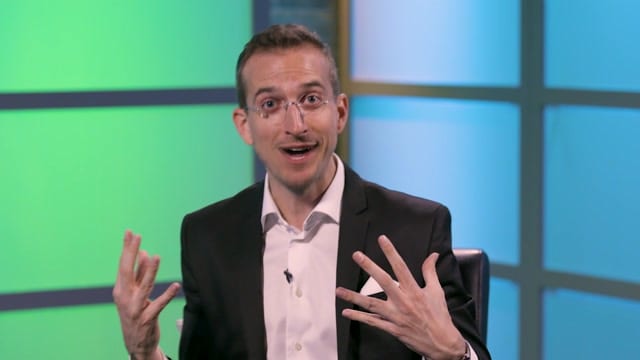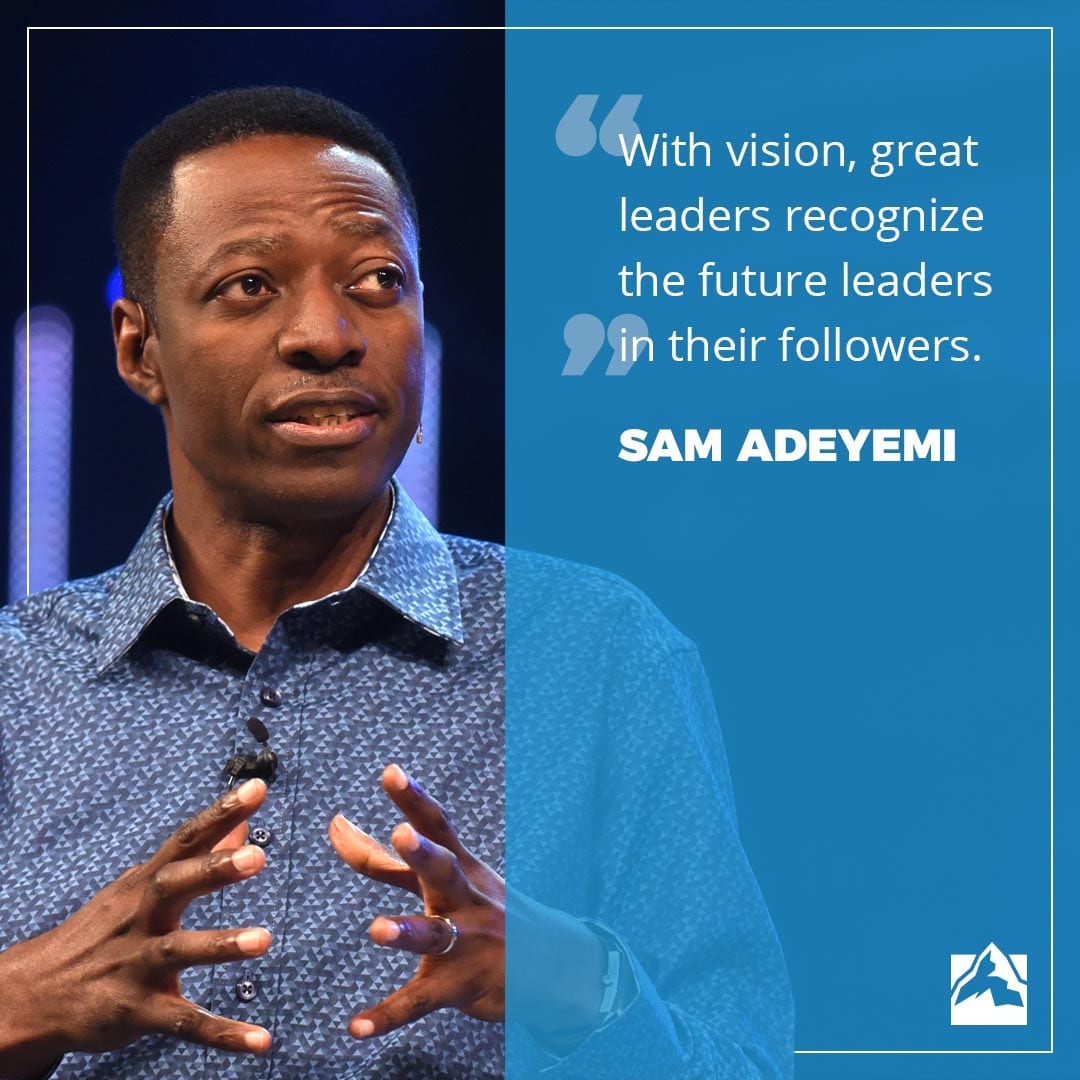
Our most powerful dreams flow from love.

Our most powerful dreams flow from love.

Jason Jaggard provides insight into how leaders can give feedback in a way that will be appreciated by the recipient.

It was my first meeting with the president of a global Christian organization, with whom I was so happy to be working. He had called me to help him with the leadership development of his Executive Team. As we were getting to know each other, I casually said, “It’s going to be fun working with you and your team because here I can talk about the spiritual aspects of leadership development, and I usually don’t get to do that.”
“Wait! Hold on a minute,” he said as he jumped out of his seat. “We don’t need any spiritual stuff here. These are very godly people—very spiritually mature. What we need is leadership development.”
“I think the two have a lot to do with each other,” I told him, “Tell me the leadership issues you are encountering.”
“Well,” he said, “I need leadership help with my team. I can’t get them to work together. They all just protect their own departments and won’t share information or resources. They are so protective of what they are doing. They are not collaborating like I need them to. They don’t work together on the bigger picture.”
“These are the ‘godly’ men you were talking about?” I asked.
My Bible says, “Love does not insist on its own way.” (1 Cor 13:5) and to get results, a team requires “mutual affection.” (2 Peter 1:7) This sounded like a conversation about spiritual maturity to me. “Let’s just focus on what they need to do differently,” I said.
So we went to work on the topic of collaboration.
This is a story I have encountered so many times. The result is that everyone suffers. In most organizations, to get stuff done, we need others to collaborate and work with us. That is the nature of an “organization.”
1) The absence of a leader who brings a team together around a very defined shared purpose and a few shared goals
Many times, each person or department has their own goals and agendas. But beyond a forgotten “mission statement,” teams often do not talk about their shared goals. A shared goal is when everyone is working on the same goal, with each doing a different part and needing each other to reach that goal.
The truth is we need each other. Leaders must spend significant time building their teams around an understanding of the shared goals. There is no such thing as a win for the individual team if the mission is not winning.
2) The absence of a leader who holds people accountable to clearly defined roles and tasks
In the second instance, the leader has failed to get the team together to really talk with each other DIRECTLY and tell each other what they need from each other in order to fulfill their part of the targeted goal. These conversations can be hard. They include accountability. Example: “Jessica, we need you to keep us in the loop and inform us least two weeks before you launch any communications that will impact us.”
The truth is that collaboration requires role clarity and a system of accountability. Leaders on collaborative teams must spend significant time addressing definition of roles, as well as assigning tasks and schedules.
Collaboration must be pretty powerful if God moved to keep all the humans from being able to do it for their own purposes, knowing its power: “The Lord said, ‘If as one people speaking the same language they have begun to do this, then nothing they plan to do will be impossible for them. Come, let us go down and confuse their language so they will not understand each other.'” (Genesis 11:6)
But today, He has commanded us to have that kind of unity so nothing will be impossible for us. As Jesus prayed, “Holy Father, protect them by the power of your name, the name you gave me, so that they may be one as we are one.” (John 17: 11)
Leaders are to do the same. Protect your mission and your people, by executing oneness through collaboration.

Had Dr. Douglas Curran never attended The Global Leadership Summit, he would probably be a retired doctor, spending time in the ranching business.
And he would have missed the opportunity to energize more than 50,000 physicians in Texas.
This year, he stepped into the role of president of the Texas Medical Association (TMA). He credits the Summit with being strategic in this adventure.
Throughout his 39 years in medicine, Dr. Curran has advocated on behalf of Texas patients and physicians. He pushed for the passage of Texas’ groundbreaking medical liability reforms in 2003; fought for sweeping patient-rights protections including holding managed care insurance companies accountable for their actions; supported legislation to improve the Children’s Health Insurance Program (CHIP) and Medicaid; and fought to protect patients from unsafe care. He has testified before legislative committees countless times, and visits regularly with Texas and Washington lawmakers to push for a better health care system.
Improving patient care and access to that care are at the top of his agenda during his year as TMA’s 153rd president. Dr. Curran has also served at multiple levels of leadership in his church.
“I think this is what God has called me to do,” he says. “And the Summit helped me believe I could do it. It has given me tools and dreams that drive me forward.”
“I’ve been attending the Summit for more than 20 years,” he said. “At one of the early Summits, I recall one of the speakers saying that if you have the gift of leadership, you will use it. It’s just a matter of how—for good and to advance the kingdom or in a less God-honoring way.” That resonated with him and changed his perspective on his personal leadership.
“When you first begin to use the gift of leadership, you realize what a great God-given treasure you have and I wanted to use it right.”
Dr. Curran says he wanted to use his gift to lead at his church and in his community, as well as in his profession as a family doctor, where he could work to improve the health care of his community, the state and the nation. “As TMA president, I will have a chance to do this,” he says. “I have already worked with Texas legislators and US legislators on many of these issues.”
He vows to take on the political and cultural polarization that he believes has throttled our nation’s ability to solve the big problems. And he plans to start with the House of Medicine.
“I think this is what God has called me to do,” he says. “And the Summit helped me believe I could do it. It has given me tools and dreams that drive me forward.” God has taught him not to be afraid to take risks and not to be afraid of the unknown.
“I am confident that over the next year, we are going to develop ideas and systems that will improve the health care of our people.”

With vision, great leaders recognize the future leaders in their followers.

Entrepreneur Liz Bohannon shares research on gender differences, like-ability, and how these perceptions impact women in leadership.

David Livermore is a leading voice on Cultural Intelligence in our world. We are honored to welcome him to The Global Leadership Summit 2018, where he will share his research on how leaders can relate effectively across diverse situations.
Whether I’m talking with my kids, interacting with our staff or speaking to a group of executives, one of the themes I talk about more than any other is the importance of “perspective taking.”
It’s something we do unconsciously all the time. What kind of gift would they enjoy? How is my colleague going to interpret this email? What does that group think about me? But we’re less likely to engage in perspective taking if the individuals with a different perspective aren’t part of our in-group.
Research reveals that perspective taking is a skill that can be developed, and that’s good news. Perspective taking is one of the most critical skills needed to manage unconscious bias and lead with cultural intelligence. You can’t motivate people and negotiate effectively if you don’t know how others think and feel about something. There’s mounting evidence that perspective taking makes a critical difference in whether diversity training actually works.
Most of us do perspective taking quite naturally with those from our in-group—our friends, loved ones and people like us. But we’re less likely to slow down and consider another’s perspective if they are outside our in-group.
Think of the age-old psychological notion of fundamental attribution error—the assumption that someone’s negative behavior stems from a character flaw, while excusing the same behavior in ourselves due to external circumstances.
Here’s how it works: If someone’s phone rings in the movie theatre, my default assumption is that they’re a rude or forgetful person who is inconsiderate of others. But if my phone rings, surely people know it’s only because I’m awaiting an urgent phone call in the midst of a crisis. This isn’t my usual behavior! According to fundamental attribution error, I’m more likely to give the benefit of the doubt to people who “look like me.”
The greater the cultural distance, the more important it is to exercise perspective taking.
Perspective taking doesn’t mean you give up your own perspective or lack conviction. In fact, this is one of the critical differences between perspective taking and empathy. Empathy may go too far in some situations. A member of the special forces who empathizes with the enemy or a sales person who is distraught about a customer’s complaints may fail to fulfill the mission of their respective organizations. But there is no way to succeed without some understanding of the “other side’s” perspective.
Perspective taking is best developed in relationship. Many people change, or at least re-evaluate their dogmatic views about religion or politics, when a friend or loved one is the one who represents the opposing perspective. Conversation and dialogue are the best ways to learn about another’s perspective.
1. Curate a more diverse social media feed. You’ll quickly see wildly different interpretations of the same current events.
2. Consciously consider the differences in how someone with an opposite position would visit a new initiative. For example, an individual with a low uncertainty avoidance orientation may be more drawn to something new than someone who is high uncertainty avoidance.
3. Use Jeff Bezos of Amazon’s “empty-chair strategy” at important meetings. By using an empty chair to represent important individuals who are not present at the meeting, attendees will be more aware of missing perspectives.
4. When discussing a challenging issue with someone, see if each of you can articulate the other person’s perspective. Clarify whether you have an understanding of each other’s perspective.
5. In the words of our friend and colleague, “Argue like you’re right. Listen like you’re wrong.” Seek to understand. It’s one of our mantras at the Cultural Intelligence Center. We know that we don’t do it perfectly ourselves, but we’re resolved to keep at it. I hope you will continue the pursuit with us.
This article originally appeared on LinkedIn, here.

Pastor Derwin Gray outlines why a pioneer spirit is necessary for those who want to pursue a multi-ethnic vision.

Growing up, fear was a big part of my life. I didn’t know what I was supposed to be, because it felt like everything I ever tried failed. I always wanted to be a pastor when I grew up, but everyone told me I couldn’t do it. I remember being in the shower, just balling my eyes out, wondering what I should do. Still unaware and unsure of my gifts and potential, I decided to enroll in seminary anyway.
It was my pastor, Tom Burgett, with Vandercook Missionary Church, who saw something in me I never saw before. He saw my leadership potential, and invited me to attend The Global Leadership Summit for the first time in 2017.
While attending the Summit, I suddenly started to realize that God had a greater calling for me in spite of my fears. I came away from the Summit with a realization of what a real leader looks like. It’s someone who takes chances, invests in people and serves. It is someone who becomes the hands and feet of Jesus, and acts as his vessel to serve people. I realized that God had a greater calling for me that wasn’t in the poor working environment that I was in at the time. I gained courage to act in leadership roles.
With this new idea of leadership, I’ve changed from thinking that leadership is about power to realizing it is about how you lead your own personal life. I realized there is influence in the power of words and prayer. When you count on God, He is already working on your behalf.
While I was processing everything I heard at the Summit, my pastor said, God has a plan for you, and I thought, I could do this. I could pursue God’s calling for me. I realized for the first time that God gave me a unique gift of discernment, and he wanted me to use it for His glory. I decided to quit my job and continue to pursue the passion God had put on my heart a long time ago.
I started teaching in a discipleship where I finally felt like I could thrive. I found courage to get out of my comfort zone. I’m also in the process of going to seminary with the desire of going into grief counseling to serve people who are struggling, to serve kids from broken homes, to serve those going through divorce or those who have lost a child.
The world says there is no such thing as hope. But God says my son is your hope! God wants me to share that. He wants me to point people to the one who provides hope and show people their worth. One day I would love, if God would open the door, to own my own grief counseling site.
My life verse is 1 Corinthians 15:58: Therefore, my dear brothers and sisters, stand firm. Let nothing move you. Always give yourselves fully to the work of the Lord, because you know that your labor in the Lord is not in vain.
I continue to stay encouraged by remembering an eternal perspective, and that none of this is in vain. I think to myself, what was I worried about this time last year? If I can’t remember, there is no significance to it. Everybody has their own story, and their own eternal life to face. If God says get out there, do it! Jesus has already done it!
He wants me to go out and make disciples. And it’s amazing to see how God intertwines people’s lives like a tapestry. Now people are coming to me and opening up and letting me introduce them to God. People have come to Christ because I reached out and served them. What if I hadn’t say yes to God’s call? I’m a vessel used by God to bring people hope, and I’m so glad I said yes. Because if I hadn’t, today I would have nothing else.

Nobody ever taught me how to make a choice. When choices are easy, there’s nothing to teach. If you’re like me though, when choices are hard, you can sometimes get totally stuck. You weigh all the options, and then just keep weighing. Finally, you pick something, but you probably end up regretting it later.
One place this shows up every year is around vacation. Preparing for vacation, you make a lot of choices. Where to go, for how long, where to stay and what to do.
Then come those dreaded words… “I know you’re on vacation, but…”
Now you’re making another choice—one of the hard ones.
You know you need some time away from the office, but the office says they need you for a moment. You’re committed to your family time and your self-care, and you’re also committed to keeping the train on its tracks back home. What do you do? Many of the hardest choices we have to make—at work and throughout life—come from these kinds of conflicting commitments.
You might have even set yourself up for this dilemma before you ever left the office. You say you want to “unplug” and get to the beach, but you’re packing your laptop, two phones, and a bag full of chargers. You’ve posted an out-of-office message, but you told colleagues you’re reachable by text. You’re ready to unwind and reconnect with your family, but you have a few last things to finish. You tell them “it will just take an hour,” but you all know that’s not true.
The Summer Dilemma is a hallmark of professional life today. It traps us in a choice between two possibilities, neither of which is entirely acceptable. A recent USA Today article says that “many people refuse to stop checking work emails and phone calls during leisure time, whether they’re in the stands at their kids’ baseball games or with their feet propped up beside a lake, clinging to mobile devices that allow them to work from almost anywhere.”
When people don’t make a clear choice between resting and working, or any other competing commitments, they usually try to do both, and succeed at neither. Since there are sacrifices either way, how do you know what to choose?
There’s no one answer that makes these kinds of dilemmas magically disappear. However, you can make peace with your own answer if you negotiate with yourself before you choose. In this article, I will share five pieces of my best advice for doing that.
It’s important to have a strategy for making choices you feel good about later. We can learn a lot about that just from the example of the Summer Dilemma.
Whenever possible, the choice should be made before it gets urgent, so negotiate with yourself about Summer Dilemma before you get in the car or board the plane. If you don’t choose your vacation interruption policy before the vacation starts, the temptation to say “this will only take a minute” will undermine your negotiation.
1) Recognize that different parts of you want different things.
You might feel torn because you really do want a vacation, but you also really want to get work done. How can that be? Which is the real you? It helps to appreciate that both of these impulses are you—they’re different sides of you. Your “personal” self wants a break, and your “professional” self wants to keep working. That’s totally normal. We all have different sides to us. Normally these different sides coordinate well and stay in their lanes, but hard choices draw them into conflict.
2) Separate different voices from each other.
The next step is to sort through the different sides of you, so you can hear what each one wants to say. Until you do that, it’s just a tense blur of noise inside your head. You can sort them by picturing the conflict you feel as a debate, with independent debaters. Another image that works well is to see this as one big negotiation, and the different sides of you are “inner negotiators.”
3) Give each debater or negotiator a role.
The next step toward clarity is to give each main voice a role or identity. If one part of you is urging you to focus on your kids and enjoy family time, you can call that inner debater Good Parent (or whatever terms and roles suit you). If another side of you dearly wants to get back into shape and use this holiday to kick-start daily runs, you can call that inner negotiator The Runner.
What are the main roles competing in your mind right now, and what name can you give to each one?
4) Consider all of the opinions before you choose.
Competitive teams thrive under the leadership of their captain. Now, in this step of the inner negotiation, you step into the role of Captain of Team You. As Captain, you listen to each inner negotiator, but don’t identify with any of them. It’s the Captain’s job to hear what each one has to say, and help them hear one another. If the inner negotiators can’t reach an agreement, then you, as the Captain, consider each negotiator’s perspective and make a choice for the all-around best outcome.
If you don’t step into the role of Captain, the loudest member of the team will win, and the other inner negotiators might undermine your choice later. But if you hear everything your inner negotiators have to say, your Captain can earn their trust and make a good choice balancing all of your competing interests.
5) Give yourself a break.
These inner negotiations can get pretty heated, and once you’ve made your choice, some parts of you may be disappointed. Your different parts have real feelings and can be deeply invested in their side of the debate. Remember to be kind to yourself while you’re negotiating, and then be kind to yourself afterward if things don’t go precisely as planned. The more you practice your internal negotiation, learning from what works and what doesn’t, the easier it will get to reach clear choices you’ll never regret.
And enjoy your vacation!
What has worked or not worked for you in facing the Summer Dilemma and other tough dilemmas? What comes up in your Internal Negotiations?
This article was originally taken from LinkedIn here.
“We welcome and encourage comments on this site. There may be some instances where comments will need to be edited or removed, such as:
If you have any questions on the commenting policy, please let us know at heretoserve@globalleadership.org”
Recent Comments